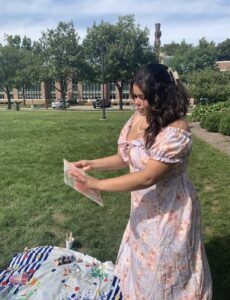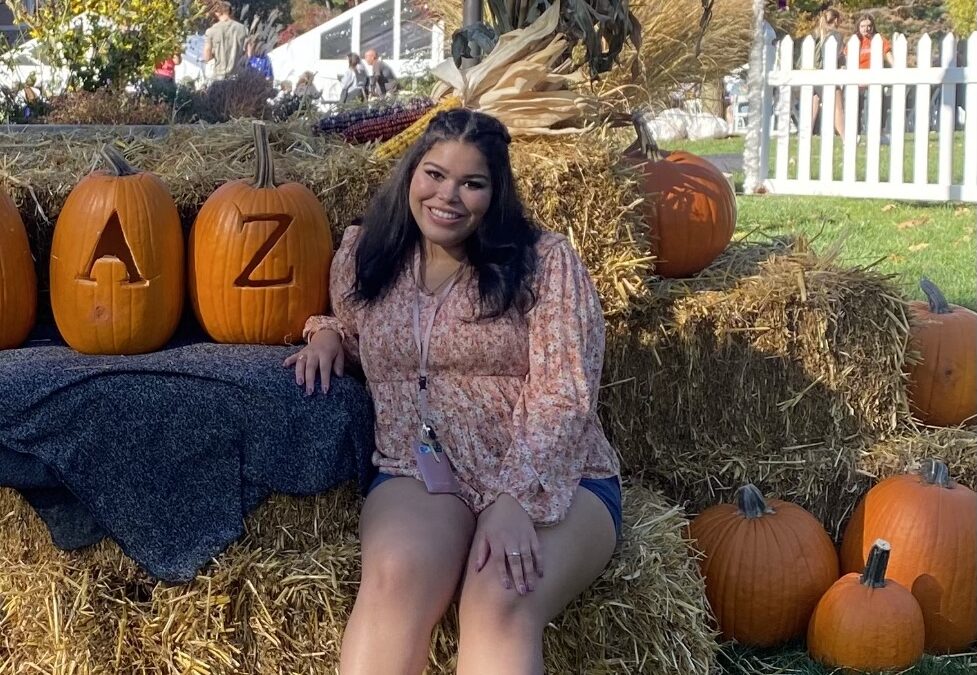I entered the start of my first semester at Nazareth eager and ambitious. I was accepted into the communications sciences and disorders (CSD) program, had attended several NazBound events, and had already connected with lots of my fellow class of 2026 peers. Despite my enthusiasm, I ended the first semester thinking, “Thank goodness that’s over!” as I’m sure many other first year students do. However, if I could have told first semester Faith what I know now, I could have avoided the burnout I experienced.
Certainly, you’re used to hearing general advice like, “Go to class,” “Study,” “Get involved,” “Get to know your professors,” etc. But — what if you are doing all of these things, and still struggling? This was the case for me. At the end of my first semester, I had to completely reevaluate my mindset and priorities in order to be more successful in the second semester. As I previously mentioned, I was excited to begin my college experience. I decided to sign up for every club that interested me and sounded like fun. After all, getting involved was important, right? No! Well, yes, it’s a good idea to join a club or two and participate in events when you can. However, I made a big mistake deciding to be a member of five clubs, and play a sport on top of that. I didn’t have enough time to devote myself truly to either group, and ended up loathing the days I would have meetings. It was too overwhelming. I learned that college clubs are much different than those in high school. The time commitment was too much to handle. I quickly realized that I would have to cut back. However, FOMO and the fear of judgment from my clubmates got the best of me. I was worried what my friends or club advisors would think of me when I stopped attending meetings. Now, I can reflect on this and say, “Who cares?” No, seriously, you are in college for yourself, no one else. It’s easy to get swept up in the crowd and base your goals off of the general public. You have to prioritize your own needs.
Another majorly important thing to consider is sleep. In late August, when classes started, I made no transition from my summer sleep habits to my fall college habits. I would stay up late to chat with friends, scroll on Instagram, cram in some last minute studying, etc. I was only getting about 5 hours of sleep, and this became my new normal. I had no energy for any of the commitments I had the next day. And although I was still actively attending classes and club meetings and practices, my participation and drive during them was at an all time low. I knew I needed to correct this so that I could demonstrate my full potential. I made an appointment with Health and Counseling on campus, and made a goal to get better, longer sleep. I stopped trying to stuff my brain with information frantically the evening before a test. I no longer pulled all-nighters to complete an assignment before class. Instead, I took out major distractions and “extras” from my day, went to bed early, and got an ample amount of sleep so that in the morning my brain was rejuvenated and ready to work.
 At the end of the semester, I decided to sign up for academic coaching, and I also met with a tutor for a couple of my classes. I was reluctant to do this as I had never needed extra help before. But I knew that it was the best option for me. Tutoring is great for everyone, even if you think you may not need it. It doesn’t hurt to sit down with someone who is well versed in the subject and share ideas. The academic coaching also helped me immensely. I had been used to my mom telling me to do my homework, when it was time to eat, and aiding in my planning. Of course, in college, your parents aren’t there to monitor your progress, and instruct you constantly to get school work done and basically control your routine. My academic coach was able to meet with me at the start of the week, help me develop a plan and agenda, and we checked back in and at the end of the week to go over what I had accomplished. Something as simple as this really kept me on task. Knowing that someone would be checking the work I did and the fact that we planned specific times to accomplish work really held me accountable.
At the end of the semester, I decided to sign up for academic coaching, and I also met with a tutor for a couple of my classes. I was reluctant to do this as I had never needed extra help before. But I knew that it was the best option for me. Tutoring is great for everyone, even if you think you may not need it. It doesn’t hurt to sit down with someone who is well versed in the subject and share ideas. The academic coaching also helped me immensely. I had been used to my mom telling me to do my homework, when it was time to eat, and aiding in my planning. Of course, in college, your parents aren’t there to monitor your progress, and instruct you constantly to get school work done and basically control your routine. My academic coach was able to meet with me at the start of the week, help me develop a plan and agenda, and we checked back in and at the end of the week to go over what I had accomplished. Something as simple as this really kept me on task. Knowing that someone would be checking the work I did and the fact that we planned specific times to accomplish work really held me accountable.
It’s safe to say that if I would have continued my habits from the first semester, I would have had an awful time managing the stress that comes with college. Being able to reflect on myself and identify my needs, along with working with an academic coach and tutors and attending Health and Counseling regularly has set me up for success. Now, in my second semester, I feel more in control of my life. I’m vice president of LASMA (Spanish Club), I work part time as a marketing ambassador and I’m an emerging leaders intern. I am able to participate and attend events on campus when my schedule grants it, my grades are fantastic, and I am sleeping 8+ hours a night. I used to think that I would have to choose between hanging out with my friends, or studying. This is not the case. Something that really helped me get through large quantities of homework was study sessions with my friends. It was a great way to complete homework, while still getting to socialize, and I would highly recommend it.
My biggest piece of advice would be that you’re going to have to make sacrifices within all the things you want. You cannot possibly do everything, and you should not hesitate to take advantage of the many resources on campus. Think about what you want your future to look like. It is critical to develop a schedule and routine that caters to you early in college so that the rest of your academic career can go more smoothly.

